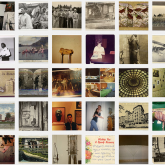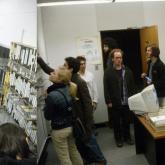Week 52: Public Collectors & Against Competition
Hi Everyone,
This Tuesday is the final event in a year-long series of weekly conversations and exhibits in 2010 shedding light on examples of Plausible Artworlds.
To wrap up the year, we’ll be talking with Marc Fischer, one of three members of Temporary Services, about his project “Public Collectors” network. In conjunction with this project we will also be discussing Marc’s manifesto entitled “Against Competition” which can be downloaded below.
http://www.publiccollectors.org/
http://publiccollectors.tumblr.com/
http://www.temporaryservices.org/against_competition_mf.pdf
The Public Collectors project seeks to redress what amounts to a massive and systemic cultural oversight whereby countless cultural artifacts are either deemed unworthy for collection by public libraries, museums and other institutions or the archives currently in existence are not readily accessible to the viewing public.
Therefore, Public Collectors invites individuals who have had the occasion to amass, organize, and inventory various cultural artifacts to help reverse this bias by making their collections public. The purpose of the project is to provide access to worlds of collected materials so that knowledge, ideas and expertise can be freely shared and exchanged.
An initiative of this kind gains its meaning and importance against the backdrop of the culture of artificial scarcity upon which mainstream artworld values are founded. The majority of this artworld is structured in this way, and not surprisingly so, as competition between individuals is at the heart of free market capitalism. Grants are competitive. Students compete for funding. Hundreds compete for a single teaching position. Artists compete with artists – stealing ideas instead of sharing them, or using copyright laws to prohibit thoughtful re-use. Artists typically compete for exhibitions in a limited number of spaces rather than seeking alternative exhibition venues. Artists conceal opportunities from their friends as a way of getting an edge up in this speculative capital-driven frenzy. Gallerists compete with other gallerists and curators compete with curators. Artists who sell their work compete for the attention of a limited number of collectors. Collectors compete with other collectors to acquire the work of artists. Essentially, these are the many reasons that make Plausible Artworlds plausible; that make alternate artworlds, premised on pooling resources and mutualizing incompetence, so important. We felt that it was all too fitting to conclude 2010’s discussions with some words that might help describe art beyond competition.






